 By Pepper Parr
By Pepper Parr
June 9th, 2023
BURLINGTON, ON
This is a good news story and an example of what can be done when people come forward with an idea and, despite some foot dragging within a department, they manage to give birth to a program that has grown.
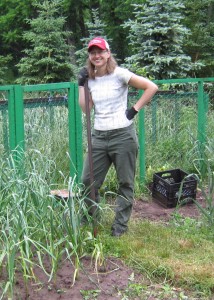
Michelle Bennett
It was back in 2012 when Michelle Bennett and Amy Schnurr delegated before council seeking support for a community for an idea. The two women had sourced some funds from the provincial government that was dependent on municipal support.
What was then the Parks and Recreation department didn’t have any money they could use and at the time didn’t appear to be all the excited about the idea.
Bennett and Schnurr convinced council that the municipal portion could be in kind and that worked. The first community garden was up and running.
They have proven to be a success year after year.
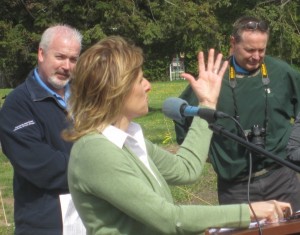
A tireless advocate for the environment – Amy Schnurr speaking at the opening of the very first community garden.
Staff produced a report outlining where the program could go and what the costs would be.
Nothing was decided at the meeting on June 1st – it was filed and will come back when the next budget is crafted.
The challenge then will be to figure out how to keep the idea alive in a Burlington that is now becoming a very different city.
There are going to be thousands of people moving to the city and living in high rise buildings where there is very little in the way of plots of land that can be turned into community gardens.
Some very creative thinking is going to have to come out of Parks and Recreation that is now known as Recreation, Community and Culture which is now led by a Emilie Cote who has shown that she can get things done and has so far come up with some very creative ideas that appear to have motivated staff in that department.
In the Staff report we learned that “The benefits of any community garden provision are well documented in social, mental and physical health materials. The residents of Burlington also agree as we continue to see increased demand for the community garden program. Throughout the pandemic years, there was a substantial increase in those seeking a garden plot.”
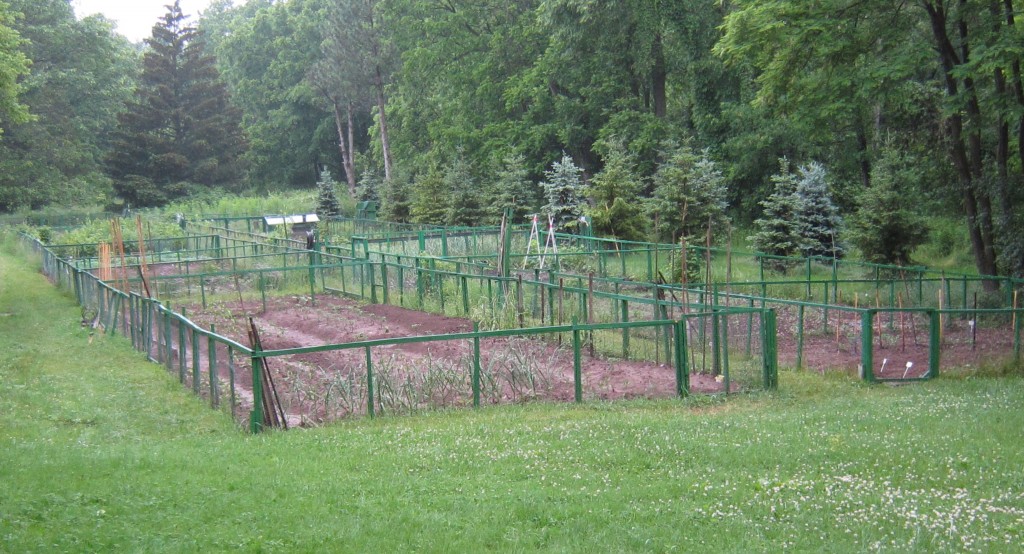
The Lutheran church in east Burlington has had a community garden for some time. It was a pattern for the community gardens now established in Central Park
What started as a two-year pilot project in 2012 with one 30-plot garden operated by Burlington Green Environmental Organization on City-owned land. At the conclusion of the pilot in 2013, operational management shifted to the City and two more gardens were added to the inventory.
There are now five gardens with a total of 231 rent-able plots and supported by one Community Garden Coordinator.
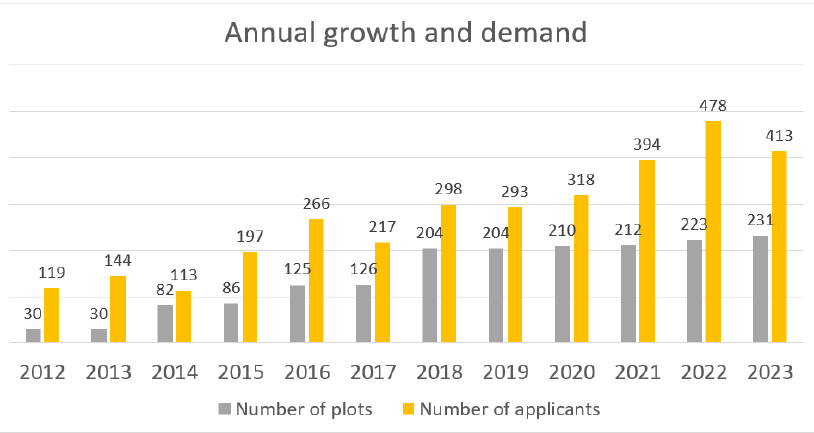
The city has pledged to create 29,000 new homes. Most of those people will live in high rise buildings. Hopefully someone somewhere will find a way to make community garden space a part of every development that is approved.
Over the past few years, staff focused marketing the Neighbourhood Community Matching Fund to encourage community to lead small projects around gardens being built in housing complexes and private lands.
In 2021 staff updated the zoning by-law to allow food gardens on any property, private or public; thus removing any zoning barriers to residential, institutional, or commercial property where people would like to have a food garden.
Staff offered consultation services to develop new gardens with schools to establish school-based gardens, condo and apt buildings, faith land resulting in Glad Tidings community garden at Mount Nemo Farm. There was an expansion at St. Christopher’s and developer land on Brant that where Grow4Change is struggling to get that operational this year,
The current operating model is no longer sustainable with just one dedicated staff person. Roads, Parks and Forestry (RPF) staff maintains the infrastructure and delivers materials annually in the spring but does not have the capacity to play a role in the day-to-day maintenance operations. Any new expansion of community gardens would require additional funding for operating and capital support.

The Community garden lots were laid out waiting for clients with seeds. The season turned out to be abundant both for garden lot users and BurlingtonGreen.
Also, there are now competing interests for the limited green space in City Parks. The Parks, Recreation and Culture Assets Master Plan (PRCAMP) update will assess the variety of community needs for green space and make the comparison on asset other municipalities to assess comparable service levels.
During the 2020 COVID Experience, the community garden service was the first to re- open by June with brand new COVID protocols. Four part-time Garden Assistant positions were created for four months when POA staff were redeployed to the community gardens. This experience highlighted the need for Garden Assistant positions as the maintenance of the garden areas and friendly customer service were much improved by their efforts.
 The community garden operations got through the pandemic and service levels went back to pre-pandemic levels without additional staff assistance beyond the one dedicated Garden Coordinator.
The community garden operations got through the pandemic and service levels went back to pre-pandemic levels without additional staff assistance beyond the one dedicated Garden Coordinator.
In 2021, Park Ambassadors were instructed to add the community gardens to their routes to provide customer service.
In 2022, a summer student Sports Field Ambassador was co-opted to become a part-time Garden Assistant. The additional 15-20 hours per week was unfortunately insufficient even though the student was excellent.
The deteriorating maintenance situation created anxiety and stress for staff. The Recreation, Community and Culture (RCC) department sourced $8,500 unbudgeted funds to pay a local landscaping company to provide a one-time maintenance fix due to the complaints.
For 2023, service improvement efforts will be piloted to compensate for no approved increase in the operational or capital budget for the service:
A volunteer opportunity via Better Impact will be piloted. This may prove helpful if there is enough interest, however, any volunteers must be supervised by city staff so a coordinated schedule will be required between volunteers and the Garden Coordinator and depend on volunteer availability.
RCC staff are investigating offering camp staff the opportunity to work in May and June as Garden Assistants prior to the July/August camp season. Staff have reallocated funds from other areas to make this possible; however, this model of reallocation is not sustainable long term.
Grant applications to Canada Summer Jobs and the Ontario Parks and Rec Association have been submitted for three Garden Assistant positions to help with short term need for current service. This is dependent on whether submissions are approved and sourcing and redirecting RCC funds to supplement wages. A long term solution will still be needed for future years and any expansion.
There is a demonstrated desire to expand the community garden program. However, to do this, there needs to be additional funds added to the current operating dollars to maintain the current inventory for maintenance and staff and/or a change to the operating model with the alignment of the required budget to expand the garden service.
To maintain a sustainable community garden program options are being considered.
Option 1 – Community Group Based
The Community Group Based option is considered when there is an identified group willing to deliver a community gardens service – This was negotiated with BurlingtonGreen in 2013/14 which provided a proposal to act as a vendor to provide this service to the City. However, the negotiations were not successful, hence operation moved to City’s care and control ever since 2014.
Option 2 – Service Provider
The Service Provider option is considered when there is an identified vendor willing to provide some of the community gardens service – This model would split the responsibilities between City staff and a vendor with the maintenance expertise. City staff would manage the plot registration and assignment, customer experience and oversee community garden development. The service provider such as a landscape company would provide the necessary maintenance and upkeep the garden inventory.
Option 3 – Enhanced City Direct Operation
The Enhanced Model for Operation by adding in financial and HR resources and a mechanism for moving to a sustainable model for delivery – This model would be scalable and would manage the current demand and future growth of community garden service. It would consist of the following additions to the current model:
• A team of four Garden Assistants for summer student positions.
• Build a robust garden volunteer program.
• Bring current operating dollars to a sustainable value for the service with continually inflationary costs added to subsequent budgets.
Staff are looking to move to an enhanced model of regular operation for summer 2024 and beyond as the most sustainable model for operating community gardens in current state.
For any capital garden projects, develop a capital planning process for expansion with the appropriate operating dollars for supplies, equipment and staff also factored into the project.
Council makes both capital and operating investments in the community garden program. The section below is a high-level overview of the investment per garden, the overall annual operating cost and annual revenues.
 Annual operating costs include the Community Garden Coordinator, operating costs to cover supplies costs provided by the Roads, Parks and Forestry department (RPF) and revenues from the plot rental. For 2023, the total net impact is $78,822.
Annual operating costs include the Community Garden Coordinator, operating costs to cover supplies costs provided by the Roads, Parks and Forestry department (RPF) and revenues from the plot rental. For 2023, the total net impact is $78,822.
Capital Investment
Capital renewal of the asset happens every 5 years with a budget of $30,000 per site.
For any capital expansion such as a new garden, capital costs include the total project budget consisting of design, construction and associated project costs. For example,
$170,000 is the planned project budget for a new garden at Nelson Park with 37 plots forecasted in 2024.
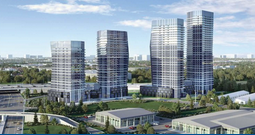
Once developments like this are populated finding space for a community garden will have been lost. This is the time to find space for the gardens.
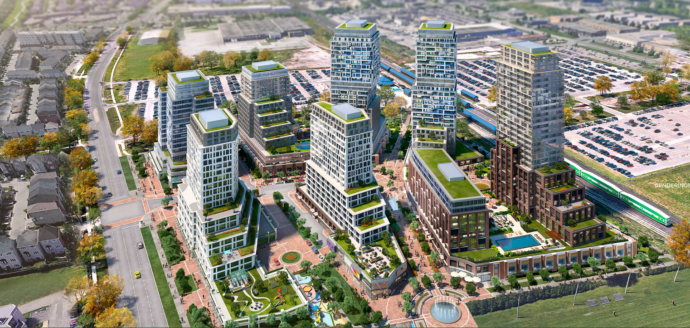 Proposed Estimation for Business Case
Proposed Estimation for Business Case
In order to maintain the existing service level, an estimation for additional funding would be $25,000 – $40,000 for items to support daily operations, to include:
• 4 PT seasonal staff ($25,000 – $36,000)
• Inflationary increases for supplies and equipment ($4,000)
For 2025, any additional funds required to cover operating costs (staff, supplies and equipment) will be requested for the Nelson Garden expansion. Any further garden builds will be pending the outcome of the PRCAMP strategy to guide any expansion requirements and site selection. As mentioned, any new capital investments will include operating budget dollars for equipment, supplies and PT staffing dollars.
Other Resource Impacts
Staff from RPF, part-time summer day camps staff from recreation and customer service from recreation support the community garden’s ongoing operations in addition to the full-time Community Garden Coordinator. In addition, the community garden also uses the support of the RCC marketing team and corporate communications to assist in getting information out about the gardens and program for resident awareness. In addition, the water cost is covered within the park maintenance budget.
Staff will be putting forward a business case through the 2024 RCC and RPF operational budgets.
Could all that space on the outskirts of the Bateman site that be turned into community gardens – better than using it for parking spaces.
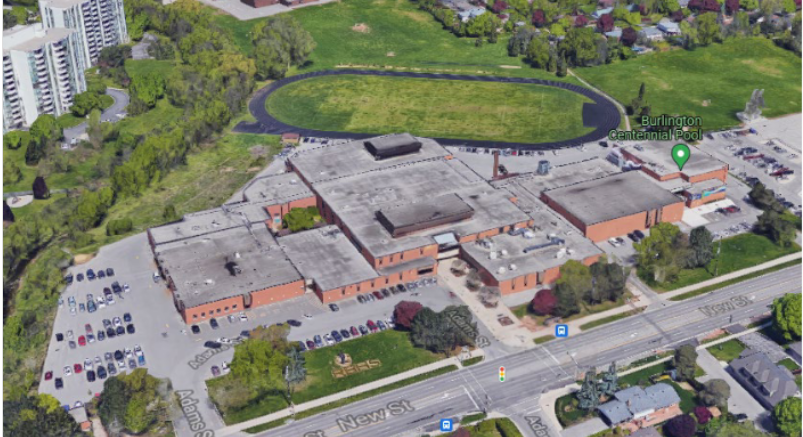
Is there room at the back of the former Bateman High School property for a community garden? Had the city held meetings for the public to have input on how that community hub would be developed community gardens would have been mentioned.
RCC and RPF staff will review the most economical option to improve the service maintenance level by increasing staff complement for the community garden service in the 2024 operating budget. This would be in alignment with for the next needed community garden at Nelson Park in ward four in the 2024 capital forecast. This next garden would take demand pressure off the Central Park community garden and expand the service into the south-east area. With the current five gardens and potential for a sixth community garden additional staff are needed to properly maintain these assets.
The Community Gardens initiative came from the community – not city hall. Hopefully city council will turn to the community for input on how this very successful program should evolve.
















The community garden program is a great asset for Burlington. I’ve participated in it since the beginning. However, I will say, that when I first saw my box on the ground … I was a little disappointed. You see, I was born in England and I remember my parents and grandparents having an allotment each, which was fairly sizeable – likely 10 times the size of what we get here. In my head I was thinking the (first time we got our community garden) … that it would look like that. Especially given the size of Canada vs England. But that said, the program is great and we get a healthy crop of vegetables each time we have it. Here’s an idea … convert all the land under the hydro right of way to allotments and we’d have allotments like in England.